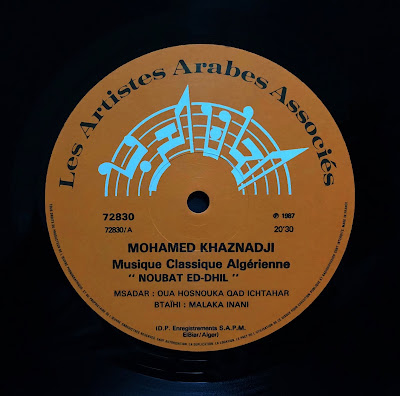ALGERIA – ALGÉRIE
Mohamed Khaznadji محمد خزناجي – Musique Classique Algérienne - Noubat Ed Dhil – Les Artistes Arabes Associés N 72830, released 1987 (LP)
Following a post on Mohamed Tahar Fergani (1928-2016), the Malouf master from Constantine, we pursue our explorations of Algerian Nuba – also known as Arab-Andalusian classical music – with a totally brilliant album by the towering vocalist Mohamed Khaznadji (b. 1929) of Algiers’ Sanâa school on the essential label Les Artistes Arabes Associés.
Born into a musical family in the Casbah in Algiers, the young Khaznadji met many musicians at his father’s musical instrument shop. After starting out as a hazzab Quranic reciter, he trained with Cheikh Abderrahmane Belhocine who taught him all the facets of the Sanâa music tradition. Khaznadji embarked on a successful singing career and taught at the conservatory in Algiers to transmit his great knowledge of the authentic Nuba heritage to future generations.
These thrilling recordings of compositions comprising various movements, preludes and instrumental solos showcase Khaznadji’s poetic and contemplative vocal modulations and quivering, supported by an orchestra featuring violins, rebab bowed lutes, a mandolin, a quanun zither, an ud lute, darbuka drums, tar tambourines and the musicians’ singing in response to the maestro’s magnificent voice.
The refined civilization created during the Muslim rule of Spain embraced many domains, from science to religion, metaphysics, poetry, music, architecture and the arts, at a time when cities like Cordoba, Seville and Granada hosted and incorporated Moorish, Arabic, Hispanic, Christian and Jewish cultures in a spirit of openness and tolerance.
Following the Reconquest of the Iberian Peninsula in the 15th century, this musical heritage of a golden age migrated to North Africa where it continued to thrive and became an intrinsic part of the Maghreb’s identity.
Suite à un post sur le maître du malouf constantinois Mohamed Tahar Fergani (1928-2016), nous poursuivons nos explorations de la Nouba algérienne – également appelée musique classique arabo-andalouse – avec un album exceptionel du chanteur Mohamed Khaznadji (né. 1929) de l'école Sanâa d'Alger sur l’incontournable label Les Artistes Arabes Associés.
Issu d'une famille de musiciens de la Casbah d'Alger, le jeune Khaznadji fréquente de nombreux musiciens dans la boutique d'instruments de musique de son père. Après avoir débuté comme lecteur du Coran (hazzab), Cheikh Abderrahmane Belhocine lui apprend toutes les facettes de la tradition musicale du Sanâa. Khaznadji se lance alors dans une grande carrière de chanteur et enseigne au conservatoire d'Alger afin de transmettre son grand savoir sur l'authentique tradition nouba aux générations futures.
Ces enregistrements de compositions comprenant divers mouvements, préludes et solos instrumentaux mettent en vedette les modulations et frémissements de la voix poétique et contemplative de Khaznadji, soutenus par un orchestre comprenant des violons, des luths à archet rebab, une mandoline, une cithare quanun, un luth ud, des tambours darbouka, des tambourins tar et le chant des musiciens répondant à la magnifique voix du maestro.
La civilisation raffinée créée pendant la domination musulmane de Espagne excellait dans de nombreux domaines, allant des sciences à la religion, la métaphysique, la poésie, la musique, l'architecture et les arts, à une époque où des villes comme Cordoue, Séville et Grenade accueillaient et s’enrichissaient des cultures maure, arabe, hispanique, chrétienne et juive dans un esprit d'ouverture et de tolérance.
Suite à la reconquête de la péninsule ibérique au XVe siècle, ce patrimoine musical issu d'un âge d'or migre alors vers l'Afrique du Nord où il continue de prospérer et devient même une partie intégrante de l'identité maghrébine.
Our other Algerian Nuba post:
The photograph below is from Andalucia : Cultura y Diversidad by Rafael López Guzmán and Ignacio Henares Cuéllar, Lunwerg Editores, 2003:
Prayer room of the Madrasa of Granada, Spain, built in 1349. Yusuf, the ruler of the Emirate of Granada at the time, founded this Islamic institution to train religious scholars:
Please help me
purchase
important traditional records to pursue my global
curation project and share the best finds with you on this blog:






Beautiful singing!
ReplyDelete